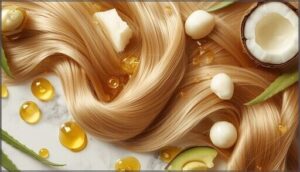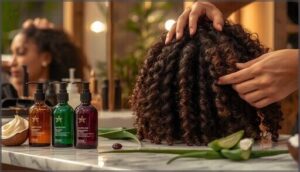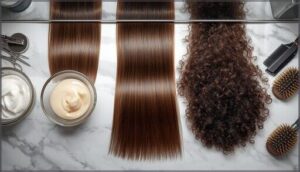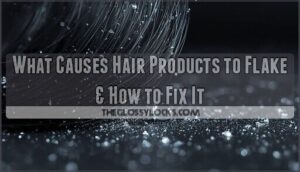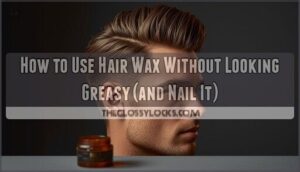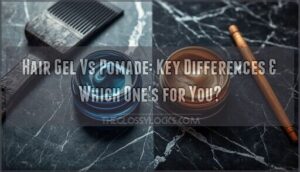This site is supported by our readers. We may earn a commission, at no cost to you, if you purchase through links.

As a cosmetic chemist, I’ve watched clients chase moisture with the wrong products, wondering why their hair still feels like straw after slathering on expensive creams. The truth? Hair moisturizing and conditioning isn’t about dumping more product on your head—it’s about understanding what your strands actually need and when they need it.
Get the chemistry right, and you’ll stop fighting your hair and start working with it, locking in hydration that lasts beyond your morning routine.
Table Of Contents
- Key Takeaways
- Essential Tips for Moisturizing Dry Hair
- Best Ingredients for Hair Conditioning
- Top 9 Shampoos and Conditioners for Dry Hair
- 1. Amika Normcore Gentle Hair Shampoo
- 2. Amika Normcore Signature Hair Conditioner
- 3. Dove Daily Moisture Hair Care
- 4. Curl Quencher Moisturizing Shampoo Product
- 5. Hydrate Shampoo For Dry Hair
- 6. Pantene Daily Moisture Shampoo Set
- 7. Olaplex Hair Care Shampoo Set
- 8. Redken All Soft Hair Care
- 9. Oribe gold lust hair repair
- Salon Techniques for Deep Conditioning
- Expert Advice for Long-Lasting Hair Hydration
- Frequently Asked Questions (FAQs)
- Conclusion
Key Takeaways
- Hair loses up to 27% of its water content under heat styling, and overwashing more than three times weekly increases dryness risk by 19%—so the real fix isn’t more product, it’s understanding what strips moisture in the first place and adjusting your habits accordingly.
- The right ingredients matter more than marketing claims: humectants like glycerin and aloe vera pull moisture into your strands, while emollients like coconut oil, argan oil, and shea butter seal it in—but sulfates and drying alcohols will undo all that work in a single wash.
- Post-wash care is critical because your hair cuticle stays open for a few minutes after rinsing, making it the perfect window to lock in moisture with leave-in conditioners and lightweight oils applied to damp hair.
- Professional salon treatments penetrate deeper than at-home products through heat activation and custom formulation, delivering concentrated ceramides, proteins, and lipid complexes that create a moisture barrier lasting weeks instead of days.
Essential Tips for Moisturizing Dry Hair
Dry hair doesn’t fix itself—it needs the right approach. Here’s why your hair feels parched, what daily habits actually work, and which ingredients are quietly wrecking your moisture levels.
Now, here’s what you need to focus on to get your hair back to healthy.
Identifying Causes of Hair Dryness
Why does hair turn into straw overnight? Overwashing strips away natural oils—washing more than three times weekly increases dry hair risk by 19%. Heat styling cranks up water loss by 27%, while flat irons above 200°C slash elasticity by 40%.
Environmental factors like sun exposure break down proteins by 32%, and low humidity environments trigger dryness in 22% of people.
Nutritional deficiencies and conditions like hypothyroidism show up as brittle strands in 85% of cases, while aging slows sebaceous glands by 20% per decade after thirty. Understanding hair damage causes is vital to preventing further hair deterioration.
Daily Hydration Habits for Healthier Hair
Now that you’ve figured out what’s draining the moisture from your hair, let’s build a routine that actually works—no trial and error, just products backed by science.
Start with hydration products containing humectants—glycerin draws water into your hair shaft, boosting hair water balance by up to 15%. Apply leave-in treatments on damp hair to lock in moisture, and cut heat styling to twice weekly to preserve healthy hair habits and prevent further damage.
How to Lock in Moisture After Washing
The real magic happens in those first few minutes after you rinse—that’s when your hair cuticle is wide open and ready to drink up whatever you give it.
Here’s your post-wash care strategy for serious moisture locking:
- Squeeze—don’t rub—excess water with a microfiber towel to prevent cuticle damage
- Apply a leave-in conditioner while hair’s still damp to seal the cuticle and trap hydration techniques inside
- Finish with a lightweight oil on ends to create a protective barrier for long-term hair health
Avoiding Ingredients That Strip Natural Oils
Your hair care routine won’t mean much if the products you’re using are actually working against you—sulfates, drying alcohols, and harsh detergents can undo all that moisture-locking work in a single wash.
Look for sulfate-free, gentle formulas that prioritize hair hydration without oil stripping.
Harsh chemicals destroy your hair’s natural barrier, so swap them for moisturizing products with natural preservatives that actually support dry hair instead of sabotaging your hair health.
Best Ingredients for Hair Conditioning
When you’re shopping for hair care, the ingredient list matters more than the marketing claims on the front. The right mix of oils, humectants, and antioxidants can transform dry, brittle strands into soft, healthy hair—but only if you know what to look for.
Let’s break down the ingredients that actually make a difference.
Benefits of Coconut Oil, Argan Oil, and Shea Butter
When your hair feels like straw, think of these three as your rescue team. Coconut oil benefits include deep penetration into the hair cortex, blocking protein loss and taming frizz—it’s why over 60% of hair moisturizing products feature it. Argan oil effects center on antioxidant protection and reducing scalp inflammation, improving dry scalp conditions in about 70% of cases. Shea butter uses focus on locking moisture into strands, reducing water loss by up to 80% for hair nourishment that lasts.
Together, these natural hydrators work through different mechanisms—coconut oil seals, argan oil protects, shea butter shields—giving you thorough hair hydration and stronger hair health. For ideal hair care, understanding hair oil benefits is essential to achieving the best results.
Role of Humectants Like Glycerin and Aloe Vera
Magic happens when humectant benefits meet thirsty hair. Glycerin effects pull moisture straight from the air into your strands, holding hydration for up to 24 hours while reducing breakage.
Aloe vera properties go deeper—polysaccharides seal the shaft, vitamins A, C, and E strengthen fibers, and enzymes calm irritated scalps.
Together, they deliver moisture retention that transforms dry, unruly hair into soft, manageable locks through exceptional hair hydration and care.
Importance of Antioxidants in Hair Care
Free radicals attack your hair every single day—UV rays, pollution, and even heat styling strip away proteins and lipids, leaving strands brittle and lifeless.
That’s where antioxidant benefits save the day. Vitamins E and C neutralize free radical damage before hair oxidation spirals, while antioxidant supplements and scalp protection formulas rebuild your hair’s natural barrier.
You’re not just moisturizing—you’re defending every strand against daily assault.
Choosing Sulfate-Free and Gentle Formulas
Sulfates might promise squeaky-clean hair, but they’re also stripping away the very oils that keep dry strands soft, smooth, and actually manageable.
Swap them for sulfate-free gentle cleansers—look for sulfate alternatives like coco-betaine or decyl glucoside that respect hair pH balance while delivering real hydration and care.
Formula customization matters: match your hair type considerations with ingredient safety, and you’ll finally lock in that moisturizing power your dry hair’s been craving.
Top 9 Shampoos and Conditioners for Dry Hair
Finding the right products for dry hair shouldn’t feel like a chemistry experiment gone wrong. We’ve rounded up nine shampoos and conditioners that actually deliver moisture where your hair needs it most—no empty promises or waxy buildup.
These picks earned their spot through solid ingredients and proven track records.
1. Amika Normcore Gentle Hair Shampoo
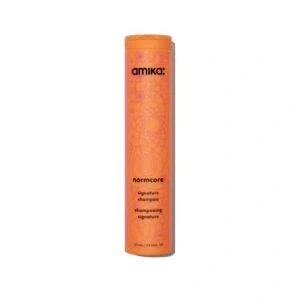
You’ve probably wondered why some shampoos leave your hair feeling stripped while others feel like liquid silk. Amika Normcore hits that sweet spot with its sulfate-free formula powered by sea buckthorn—one of nature’s rare sources of omega 7 fatty acids.
Clinical tests show it delivers hair that’s 7 times more conditioned when paired with the matching conditioner, and 94% of users agree it cleanses gently without stealing moisture.
The coconut acid base manages lathering while maintaining scalp health, making it ideal for fine to medium hair types seeking moisture balance without heaviness. At $27, it’s a solid investment in hair nourishment and hydration.
Best For: People with fine to medium hair seeking gentle, sulfate-free cleansing that hydrates without weighing hair down, especially those with color-treated or sensitive scalps.
- Clinically proven to deliver 7 times more conditioning when used with matching conditioner, with 94% of users confirming gentle cleansing without moisture stripping
- Contains sea buckthorn omega 7 fatty acids and coconut acid for lightweight hydration that reduces frizz and dullness while maintaining scalp health
- Cruelty-free, sulfate-free formula with sustainably sourced ingredients and recyclable packaging through Terracycle, plus long-lasting amber vanilla scent
- Higher price point at $27 compared to drugstore alternatives, which may not fit all budgets
- Large bottles lack pump dispensers, making application awkward and potentially messy during use
- Some users with very fine or oily hair report needing more frequent washing, and the intense fragrance may not appeal to everyone initially
2. Amika Normcore Signature Hair Conditioner
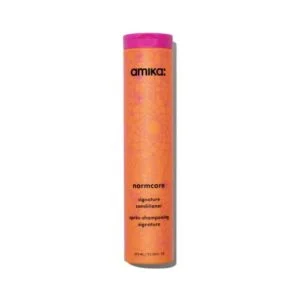
Think of this conditioner as the perfect follow-up to your cleansing ritual—it’s where real moisture magic happens. The shea butter-rich formula locks hydration deep into your hair shaft, while sea buckthorn oil’s omega 7 delivers serious elasticity.
You’re getting 7 times more conditioning power when used with the matching shampoo, and over 3,100 customer reviews back its 4.9-star rating for weightless softness.
Apply mid-lengths to ends, wait two to three minutes, then rinse with cool water to seal that moisture in—your hair will thank you with reduced frizz and zero greasiness, even on fine strands.
Best For: Anyone with fine to thick hair looking for a lightweight conditioner that delivers serious hydration and softness without weighing strands down or leaving greasy residue.
- Clinical results show 7x more conditioning when paired with the matching shampoo, with a 4.9-star rating from over 3,100 reviews backing its performance
- Packed with shea butter, sea buckthorn oil (omega 7), and antioxidants that deeply nourish while keeping hair bouncy and frizz-free
- Works for all hair types and a little goes a long way, making the bottle last longer than you’d expect
- At $24 (even with the 11% discount), it’s pricier than drugstore options and some users question the value
- A handful of reviewers found it didn’t moisturize as deeply as they hoped, leaving their hair feeling dry
- The smaller bottle size might not cut it if you have very long or thick hair and wash frequently
3. Dove Daily Moisture Hair Care
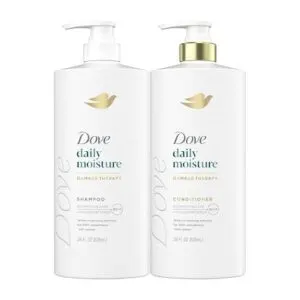
If you want that drugstore budget with science-backed results, Dove Daily Moisture delivers. The Bio-Protein Care and hyaluronic serum work at the molecular level to rebuild hair strength—think 1 trillion protein strength builders per wash.
Your hair gets 100 hours of hydration with the full three-step system, and the vegan formulas earn PETA approval. Users rate it 4.7 stars for transforming dry, color-treated strands into soft, manageable hair.
At around $14 for both shampoo and conditioner, you’re getting serious moisture levels and hair regeneration without the luxury price tag.
Best For: Budget-conscious shoppers with dry, damaged, or color-treated hair who want scientifically-backed hydration without spending on salon brands.
- Bio-Protein Care and hyaluronic serum deliver 100 hours of hydration with molecular-level hair strengthening
- Vegan, PETA-approved formula that’s cruelty-free and works across all hair types
- Affordable pricing at around $14 for both shampoo and conditioner with strong 4.7-star user ratings
- Some users report the formula feels heavy on fine hair textures
- Not universally effective—a few reviewers experienced drying effects instead of moisture
- Scent may differ from other Dove products, which can be inconsistent for brand loyalists
4. Curl Quencher Moisturizing Shampoo Product
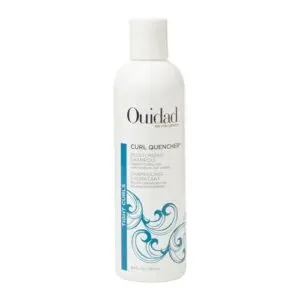
If you’re rocking curly hair, Ouidad’s Curl Quencher addresses the unique hydration challenge of tight coils. Wheat amino acids and hydrolyzed proteins strengthen each strand from within, while chamomile and vitamins A and E deliver real hair restoration.
The sulfate-free, vegan formula preserves natural oils—essential for curl definition and moisture infusion. Users love the 4.3-star performance: soft, frizz-free spirals without that stripped-clean feeling.
At $19.20 for 8.5 ounces, you’re investing in specialized hair care that actually understands how curly hair behaves at the molecular level.
Best For: Anyone with tight curls, corkscrew coils, or color-treated curly hair who needs serious moisture without sulfates or heavy buildup.
- Sulfate-free, vegan formula with vitamins A and E actually hydrates without stripping natural oils, keeping curls soft and defined
- Works well on color-treated hair and sensitive scalps since it’s free from parabens, silicones, and harsh chemicals
- Gets solid 4.3-star reviews for reducing frizz and improving manageability, even in dry winter conditions
- At $19.20 for 8.5 ounces, it’s pricier than drugstore options (though it lasts about two months)
- Some users don’t love the scent, which is a personal preference thing
- Using it too often can cause tangling in some curl types—might need to alternate with other products
5. Hydrate Shampoo For Dry Hair

Pureology Hydrate Shampoo brings serious science to dry hair care. This sulfate-free formula packs rose extract and green tea alongside AHA/BHA complexes that actually penetrate the hair shaft.
You’ll notice the difference: 3X more moisture retention and 93% easier detangling, thanks to humectants like glycerin that lock water molecules into your cuticle layer.
The vegan blend works within that ideal 4.5–5.5 pH range, so you’re hydrating without disrupting your scalp’s natural barrier.
At $74 for the duo, it’s a splurge—but the ingredient chemistry delivers measurable results for medium to thick, color-treated hair that’s thirsty for real hydration.
Best For: Color-treated, medium to thick, dry hair that needs deep hydration without sulfates or harsh chemicals.
- Delivers 3X more moisture and 93% easier detangling with clinically-backed ingredients like glycerin, rose extract, and green tea
- Vegan, sulfate-free, and pH-balanced (4.5–5.5) formula protects color and won’t irritate sensitive scalps
- Contains over 60 active ingredients including vitamin C and AHA/BHA for real moisture penetration and shine
- Pricey at $74 for the shampoo-conditioner duo, which may strain tighter budgets
- Not ideal for fine or thin hair—formula is designed for thicker textures
- Some users find the scent too strong or overwhelming for daily use
6. Pantene Daily Moisture Shampoo Set
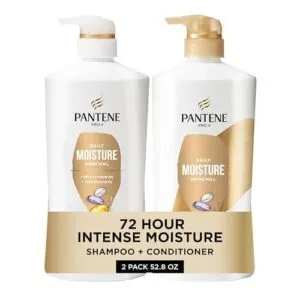
Pantene Daily Moisture delivers drugstore-friendly hydration with real chemistry behind it. The Pro-V formula relies on panthenol (pro-vitamin B5) and strengthening lipids to wrap each strand in micro-moisturizers that claim up to 72 hours of softness.
You’re getting 2X moisture versus non-conditioning shampoo, and over 4,000 reviewers back that up with a 4.7/5 star rating. The paraben-free liquid works across all hair types, though silicones like Dimethicone mean you’ll want a clarifying wash every few weeks to avoid buildup.
At $19.99, it’s salon-quality hydration without the salon price tag.
Best For: Anyone with dry or damaged hair who wants affordable, long-lasting hydration that actually works without breaking the bank.
- Delivers up to 72 hours of softness with a proven Pro-V formula backed by 4.7/5 stars from over 4,000 reviews
- Works across all hair types and is paraben-free, making it gentle enough for daily use and safe for color-treated hair
- Costs just $19.99 for salon-quality results, with micro-moisturizers and antioxidants that penetrate deep for root-to-tip nourishment
- Contains silicones like Dimethicone that may cause buildup on some hair types, requiring occasional clarifying washes
- The strong wild berry and vanilla fragrance might not work for people with scent sensitivities
- A small number of users report scalp irritation or increased shedding after long-term use
7. Olaplex Hair Care Shampoo Set
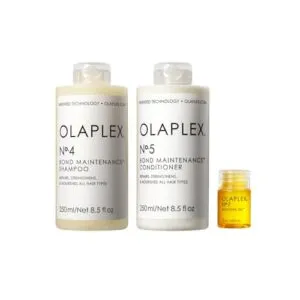
Olaplex Hair Care Shampoo Set brings patented bond-building chemistry straight to your shower. The No.4 shampoo and No.5 conditioner use Bis-Aminopropyl Diglycol Dimaleate to repair broken disulfide bonds from heat, color, and chemical damage—real hair repair tips backed by HRIPT safety testing.
You’re also getting No.7 Bonding Oil for 72-hour frizz control and 450°F heat protection. The sulfate-free, vegan formula works across all hair types, delivering measurable improvements in shine and moisture retention.
At $64, it’s an investment, but the Olaplex benefits and ingredient science justify the premium—especially for chronically damaged or color-treated hair.
Best For: Anyone with damaged, color-treated, or chemically processed hair looking for a science-backed repair system that rebuilds bonds and reduces breakage.
- Patented bond-building technology (Bis-Aminopropyl Diglycol Dimaleate) actually repairs structural hair damage at the molecular level
- Complete system includes shampoo, conditioner, and heat-protecting oil with 72-hour frizz control and 450°F thermal protection
- Sulfate-free, vegan, cruelty-free formula that’s been safety-tested and reformulated to remove controversial ingredients
- Expensive at $64, which puts it out of reach for budget-conscious buyers
- No.7 Bonding Oil bottle is small and may run out quickly with regular use
- Company’s recent financial struggles (68% drop in net income) raise questions about long-term availability and support
8. Redken All Soft Hair Care
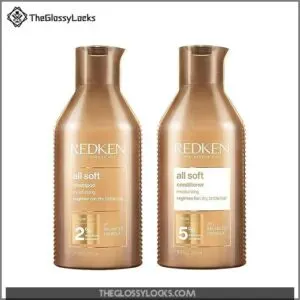
Redken All Soft Hair Care delivers Argan-6 Moisture Complex with targeted RCT Protein Complex—feeding nourishment to root, core, and tip. You’re getting 15 times more conditioning than basic shampoos, plus soy protein to lock in hair moisture and rebuild body in brittle strands.
The vegan formulas are sulfate free (though they include sodium laureth sulfate for cleansing), and bottles use 100% recycled plastic.
At $54, Redken products offer lightweight hair hydration and care for fine to medium dry hair without weighing it down—ideal if you need serious softness without the grease.
Best For: People with fine to medium dry, brittle, or damaged hair who want lightweight moisture and shine without heavy buildup.
- Delivers 15 times more conditioning than basic shampoos with argan oil and RCT Protein Complex that targets root, core, and tip
- Lightweight formulas won’t weigh down fine hair while providing serious softness and reducing frizz
- Vegan formula with 100% recycled plastic bottles and multiple awards including Best Shampoo from a Specialty Store
- At $54, the price is steep for what some users report as small bottle sizes
- Contains sodium laureth sulfate despite “sulfate-free” marketing, which may irritate sensitive scalps
- Won’t work well for very oily hair types or those who need heavier moisturizing treatments
9. Oribe gold lust hair repair
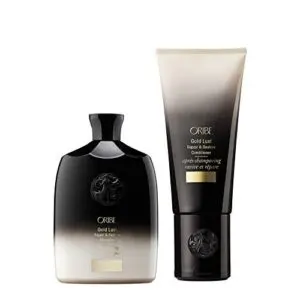
For luxury hair care products that deliver real hair repair, Oribe Gold Lust stands out with biotech-engineered peptides and amino acids that reinforce each strand from the inside.
You’re getting moisturizing tips from a formula that seals the cuticle, while coconut and argan oils provide deep hair hydration and care.
At $109, these luxury brands aren’t cheap, but the sulfate-free, paraben-free chemistry actually restores moisture in damaged hair—reducing split ends and protecting against future breakage.
If your hair health and maintenance budget allows, this hair treatment offers serious rejuvenation without weighing down fine or thick textures.
Best For: Anyone with dry, damaged, or aging hair who wants professional-level repair and is willing to invest in a premium treatment that works across all hair types.
- Deeply repairs and strengthens hair from within using biotech peptides and amino acids while sealing moisture into each strand
- Clean formula that’s sulfate-free, paraben-free, gluten-free, and vegan, making it safe for sensitive scalps and color-treated hair
- Reduces split ends and protects against future damage while leaving hair soft, smooth, and noticeably healthier
- High price point at $109 puts it out of reach for many budgets compared to drugstore alternatives
- Bottle size may feel small relative to the cost, especially if you have long or thick hair that requires more product
- Won’t add much volume, so if body and lift are your main concerns, you might need additional styling products
Salon Techniques for Deep Conditioning
Sometimes your hair needs more than what a home routine can deliver. Professional deep conditioning treatments work differently—they use heat, steam, and concentrated formulas that penetrate deeper than anything you’ll find at the drugstore.
Salons have specialized options to bring even the driest, most damaged strands back to life.
Professional Hair Masks and Treatments
That warm towel wrapped around your hair at the salon? It’s doing more than making you feel relaxed. Those 20 minutes deliver concentrated ceramides, proteins, and lipid complexes in doses your bathroom cabinet can’t touch.
Professional masks penetrate deeper and stick around longer. Here’s why they’re worth the appointment:
- Intensive heat activation helps actives like keratin and hydrolyzed collagen bind to damaged cuticles
- Custom formulation blending targets your specific dryness pattern—whether it’s chemical damage or environmental stress
- Professional-grade emollients create a moisture barrier that lasts weeks, not days
Custom Curl and Natural Hair Services
Curly and textured hair doesn’t follow the same rulebook as straight strands—it craves moisture like a desert craves rain, and generic conditioning formulas just won’t cut it when you’re working with coils, kinks, or waves that naturally resist hydration.
Custom curl services at salons go beyond basic conditioning by analyzing your hair porosity first—determining whether your cuticles are wide open or tightly sealed—so your stylist can layer the right humectants and butters for actual curl definition and frizz control, not just temporary shine.
Texturizing and Smoothing Treatments
Texturizing and smoothing treatments flip the script on frizz by restructuring your hair’s keratin bonds—keratin treatments rebuild diameter by up to 49% and nearly double breaking strength, giving you sleek, manageable strands that hold moisture for roughly 12 weeks.
But here’s the catch: older chemical relaxers and hair straightening formulas often contained harsh sodium hydroxide or formaldehyde, which stripped natural oils and risked scalp damage, so modern texturizing smoothing treatments now lean on plant-based proteins and formaldehyde-free agents for safer hair hydration and care without compromising hair health.
How Salons Address Different Hair Types and Textures
Smart salons don’t just grab products off the shelf. They start by mapping your hair’s porosity, curl pattern, and damage profile—because what works for a thirsty 4C coil is polar opposite to what heat-damaged 2A waves need when they’re drowning in protein.
A good consultation digs into your hair’s texture and builds a custom plan around what your strands actually require:
- Low-porosity hair gets lightweight humectants and heat-activated treatments for better product penetration
- High-porosity or damaged textures receive protein-rich masks to rebuild structure and lock in hair hydration and care
- Coily and textured hair types benefit from oil-based conditioning that mimics natural sebum distribution
Stylist training on hair health and maintenance plus real-time client feedback ensures your hair moisturizing protocol actually works.
Expert Advice for Long-Lasting Hair Hydration
Getting your hair hydrated is one thing—keeping it that way is another game entirely. The science of moisture retention comes down to smart habits, protective strategies, and knowing when your DIY routine needs backup.
The tactics that actually lock in long-lasting hydration, backed by formulation science.
How Often to Moisturize and Condition
You’d think there’s a one-size-fits-all answer, but honestly, how often you need to moisturize and condition depends entirely on your hair’s porosity, texture, and what you’re putting it through daily.
High-porosity or textured hair? You’ll want hydrating treatments at least twice weekly. Fine hair might only need conditioning schedules every few days to avoid weighing it down.
Pay attention to how your strands feel—that’s your best guide for product rotation and hydration routines.
Nighttime Routines for Moisturized Hair
While you’re sleeping, your hair is actually losing moisture to your pillowcase—but a few smart tweaks can turn those eight hours into a hydration opportunity instead of a setback.
Try hair wrapping with a silk scarf or sleep caps to lock in hydrating overnight oils or a nourishing hair mask.
In the morning, refreshers reactivate that moisture without rewashing—your strands wake up softer, not stripped.
Protecting Hair From Environmental Damage
Sun, wind, chlorine, and even pollution are constantly working against your hair’s moisture barrier—think of them as the unseen thieves between your nighttime routine and your next wash. UV protection isn’t just for skin—hair sunscreen with climate control polymers shields strands from air pollution particles that cling to cuticles and disrupt hair hydration and care.
In high humidity management zones, anti-humectant serums prevent moisture overload, while in dry climates, leave-in treatments with hydrating oils seal your hair health and maintenance work before you step outside.
When to Seek Professional Help for Dry Hair
When should you stop DIY-ing and call in the experts? If your dry hair stays rough after six weeks of weekly deep conditioning, that’s your cue for a Trichologist Consultation.
Professional Treatment Options like salon-grade keratin deliver 60% better penetration than home masks. Persistent Hair Breakage Prevention issues—snapping mid-shaft, zero elasticity—signal damaged hair needing Scalp Health Assessment.
Don’t ignore ongoing Dry Hair Diagnosis red flags: your hair health and maintenance deserves expert intervention when hair hydration and care efforts flatline, especially with complex hair type considerations.
Frequently Asked Questions (FAQs)
Can you over-moisturize or condition your hair?
Think of your hair like a sponge—it craves balance, not saturation. Yes, over-conditioning can disrupt moisture levels, especially if your hair porosity is low.
Excess hydrating products create buildup, leading to limp, greasy strands instead of damage control and healthy hair hydration.
What causes hair to lose moisture overnight?
Friction from cotton pillowcases and low bedroom humidity are the main culprits behind overnight moisture loss.
Your hair literally rubs against fabric all night, lifting cuticles and allowing water molecules to escape—especially when the air’s bone-dry from heating or AC.
How does hard water affect hair hydration?
Hard Water Effects on hair hydration are significant—mineral buildup from calcium and magnesium creates a barrier that blocks moisture absorption, leaving strands parched and brittle.
This compromises Moisture Balance, disrupts Scalp Health, and exacerbates dry hair regardless of your hair type or how many hydrating products you use.
Are leave-in conditioners better than rinse-out formulas?
Neither option wins—it’s about hair type matters and your routine. Leave-in benefits include ongoing moisture retention for textured or dry hair, while rinse-out conditioner comparison shows better deep hydration during washing.
Product ingredients and hair care treatments determine which hair moisturizing approach suits your needs.
Does hair porosity affect moisturizing product choice?
Skip the porosity test and you’re basically buying products blind—like grabbing shoes without knowing if they’re your size. High porosity hair needs heavier oils and proteins to lock in moisture, while low porosity hair does better with lightweight formulas that actually penetrate instead of sitting on top.
High porosity demands heavier oils and proteins for moisture retention, while low porosity thrives with lightweight formulas that improve product penetration without buildup affecting hair health.
Conclusion
You can’t water a garden once and call it done—hair’s the same way. It needs regular attention, not a one-and-done soak.
Hair moisturizing and conditioning works the same way: it’s about building a rhythm that matches what your strands actually absorb, not what marketing claims promise.
Start with the science—humectants, emollients, and protein balance—then trust your fingers over the hype.
Trust science—humectants, emollients, and protein balance—over marketing hype when choosing hair products
Your hair will tell you when you’ve cracked the code: it’ll stop breaking, hold its shape, and finally feel like it’s working with you instead of against you.
- https://pmc.ncbi.nlm.nih.gov/articles/PMC11846515/
- https://www.imarcgroup.com/hair-conditioner-market
- https://www.dyson.com.sg/newsroom/global-hair-study-2022
- https://www.lubrizol.com/company/insights/2022/11/textured-hair-consumers-reveal-what-they-want-in-products
- https://jcadonline.com/a-randomized-placebo-controlled-clinical-study-evaluating-a-dietary-supplement-for-hair-growth/

